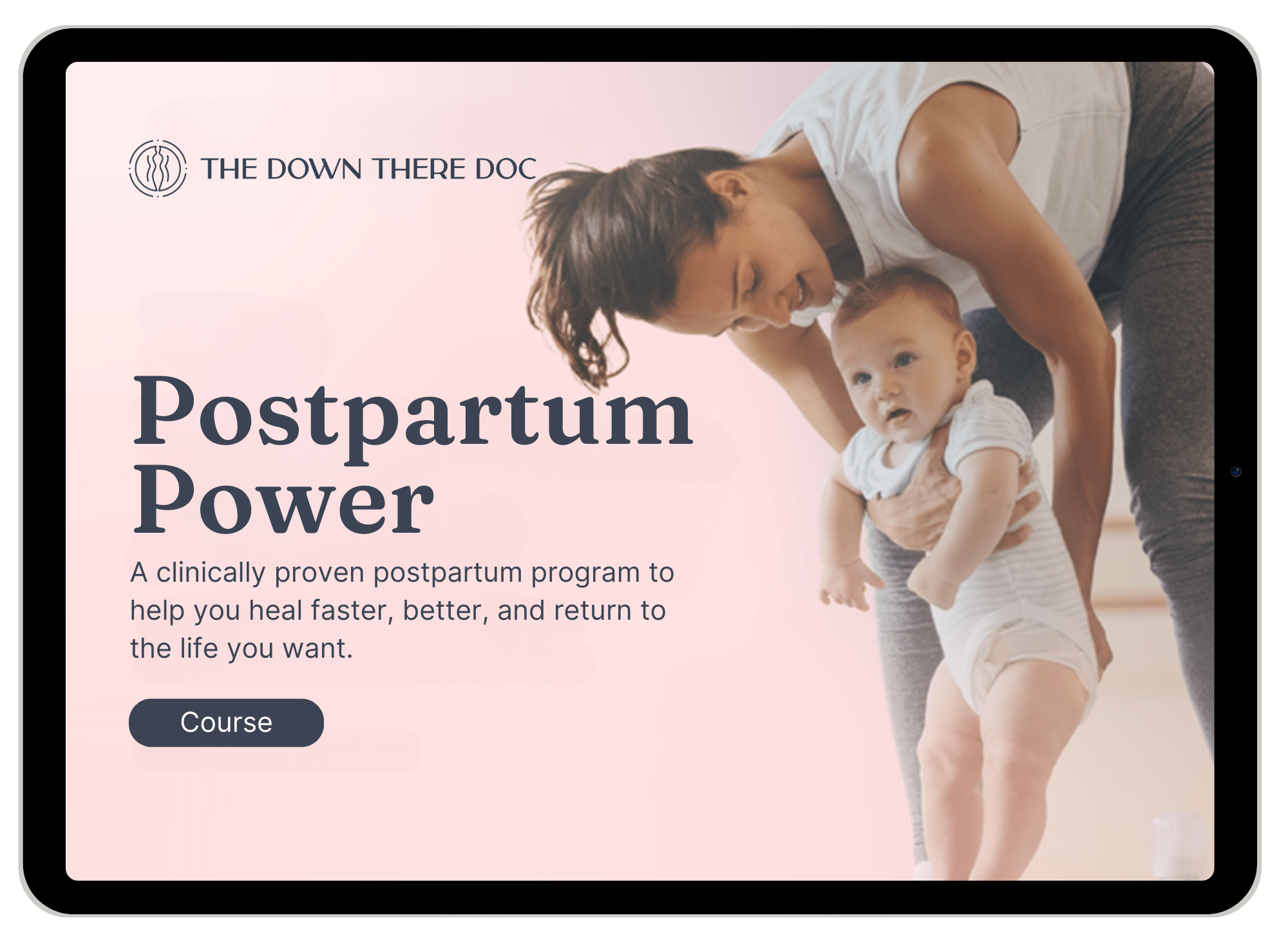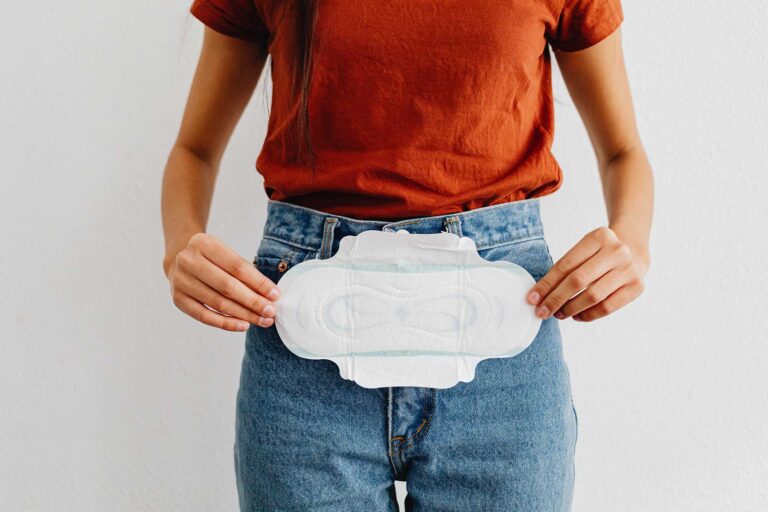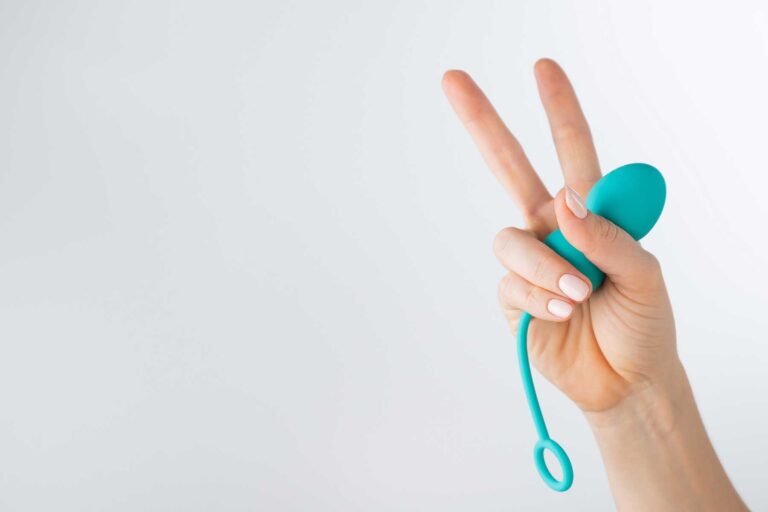The postpartum period is a transformative time in a mother’s life. But that doesn’t mean that it’s always unicorns and rainbows.
You may be feeling scared, overwhelmed, lost, isolated, unhappy, exhausted, sad, or not connected to the baby yet. Postpartum anxiety, depression, rage, and baby blues may be concerns. Your mental health and emotions are valid and important, and you deserve a support network ready to help you navigate this period.
Along with caring for your mental health, your physical health and your body also need a little TLC. It’s important to rest and recuperate during this time, but it’s also important to start moving your body a bit — something that can also help your state of mind.
While you certainly don’t want to overdo it, “early mobility” is important to help with physical healing and mitigating health risks that increase from being immobile — like deep vein thrombosis (DVT) and injury caused by muscle weakness. Still, many people don’t know where to begin.
Enter postpartum physical therapy. Working with a physical therapist (PT) who specializes in postpartum can help you start moving again in a safe, supported way, and also give you space to work through any challenges you may be facing in the fourth trimester.
Still, postpartum physical therapy is a service that is often overlooked, underutilized, or simply unknown. There are a lot of common myths that keep people from seeking out the help of a postpartum PT. Let’s bust those myths now, and get you on your way to recovery.
See Also

Postpartum Power
6 myths about postpartum recovery
The fourth trimester is defined as the time period from birth to 12 weeks, and so much happens during that time that sometimes it’s hard to even know which way is up, which way is down, what day it is, and when you last showered.
If you’ve already had a baby, you know what I mean. If you are about to have a baby, this is important — listen up.
The 6 week check up is usually when you get that “all clear” sign, but we are often far from recovered, even if our stitches are healed. Let’s dive into common myths and mistakes of the postpartum time period, and let me assure you, we’ve all done these, even me.
Myth 1: If you don’t have any symptoms, you don’t need to schedule
Nope! Think about it this way: if you wait to drink until you are thirsty, you are already dehydrated. The same thing goes for mental health and physical rehab after having a baby.
It is so beneficial to schedule and establish care with a provider or team BEFORE your baby comes, so if and when you need someone you are ready to go. I’d recommend considering this for both mental health support and pelvic floor physical therapy (PT).
There is a ton of evidence that support patients coming to PT as a preventative measure (1Trusted Source, 2Trusted Source, 3). If you’re able to talk with a provider or establish care prior to having symptoms (like pain, leaking, prolapse, etc), we can help decrease the risk or severity of those things happening and also improve recovery.
To make things easier on new parents, many health care professionals now offer virtual sessions. Even if you don’t have access to a postpartum physical therapist in your neighborhood, you can book a complimentary consultation from one of our DownThereDoc providers to get your team in place now.
If you don’t need us, fabulous! But we are here for you if you do.
Myth 2: You’re completely healed and recovered at 6 weeks postpartum, and ready for anything
Oh lord almighty. How much time do we have to talk about this? This myth is basically the genesis of my entire career.
Let’s set the record straight: healing and recovery are 2 completely different things. Your tissues may be healed at 6 weeks, your scar is probably stable and closed, your stitches are dissolved, and you are probably bleeding less and less. But tissue healing is much different than recovery.
Recovery can take months, and even years. And for some, the issues that they are experiencing after having a baby last their entire life. So I would say, no. In fact, you are not recovered at 6 weeks postpartum.
Some birthing persons feel awesome at that time and don’t experience any issues after birth. But some do, so let’s consider: what we “comparing” our postpartum recovery to? What is the 6-week standard we are measuring against?
Because let me tell you, from a musculoskeletal perspective and physical therapy perspective, we would never encourage our patients go into a a full-blown sport or activity 6 weeks after an injury with ZERO rehab. It doesn’t happen.
We do not tell our other patients to do nothing for 6 weeks after an injury or surgery, and then at the 6 week mark do everything.
So hear this: recovery is different than “healing”. Nothing magic happens at the 6 week mark — it’s not like at 5 weeks and 6 days you can’t run, and then at 6 weeks you can.
It’s ok and “normal” for our bodies to take longer to heal from having a baby — it’s physiology.
Myth 3: You have to get back to your pre baby weight or jean size to “bounce back” from baby
Once again… nope! The emphasis promoted by media, and society in general, is that we should aim to look like we never had a baby.
This is BS, because I’m pretty sure you did just have a baby, so why is it “bad” to look like you didn’t? The term “bounce back” or “get your body back” after baby makes my skin crawl.
You didn’t lose your body in your diaper bag or minivan. It’s not gone. You don’t need to locate it. Pre-baby weight and jean size are irrelevant to healthy, functional, happy, and happy bodies.
Losing the weight comes easy for some, and for some it doesn’t. Some of us lose weight when we breastfeed, some of us do not. Some of us pop a baby out easily, most of us do not. And that’s ok.
Exercise and fitness after baby should not be focused on losing weight so you can “go back” to what you looked like before. It should be focused on what makes you happy, what gives you balance, what helps you heal and recover and feel healthy and strong.
Postpartum health and recovery is a long term and important part of your life, it should be structured as so. It’s ok to look like you had a baby, because you did. We don’t “bounce back” we “bounce forward.”
Myth 4: Leaking, pain with sex, prolapse, and other pelvic floor issues are “normal” since you’ve had a baby
Not to beat a dead horse, but where is my stick?
In addition to that being plainly false, we also have to unpack the idea that having those symptoms is what we “get” for wanting to be a parent.
Which is also… awful. We know these issues don’t go away on their own (which is why the pad and incontinence industry is so lucrative) and we know that most women experience these issues throughout their lifespan, often starting with pregnancy and birth.
So we know that these don’t go away on their own, and we know that we’ve been told for GENERATIONS that we have to suck it up and deal with them on our own. But I’m here to tell you: having a baby is not a life sentence for pelvic floor dysfunction.
Postpartum is forever, pelvic floor issues don’t have to be.
Myth 5: You’re a bad parent if you don’t…
Insert anything here, really: breastfeed, quit work, stay up all the time with the baby, take the brunt of the housework and childcare, sacrifice who you are, give up the things you love doing so you can be available 100% of the time…
Let me explain something: mom guilt is real, mom-shaming is real, and feeling inadequate as a mom is very common. I didn’t even touch store-bought baby food or Pampers because I thought I would be a bad mom or judged.
Things changed with the second kid, but I was paralyzed by anxiety, guilt, and shame the first time around. With the second, I was so exhausted I cared a little less than I did before.
You’re not a bad mom if you choose to formula feed, or sleep train, allow your baby take naps in the stroller, or go back to work, or whatever. We are all doing the best we can, and our babies know we love them. If only they knew how much we agonize over the littlest things, with their best interests in mind. It’s exhausting.
The same goes for your recovery after birth. It’s ok to take some time for you, to go at your own pace, and to acknowledge the things that you are experiencing physically or emotionally.
Both C-sections and vaginal deliveries are hard on our bodies. You’re not a bad parent, or “weak,” or being “too sensitive” if you realize that you’re not happy with how you are feeling. You are paying attention to your body and prioritizing your health and happiness. It’s a good thing to do.
Myth 6: Pelvic floor treatment is too expensive, so I’ll just watch some YouTube vids and do Kegels at red lights
Ummm… no. YouTube and the grand ol’ interwebs can be helpful resources, for sure. But how often have you scrolled and scrolled and scrolled until the wee hours of the morning and STILL felt lost and unsure? It’s overwhelming.
Also, let me tell you: postpartum recovery is not just about “Kegels.”
In fact, most women with just verbal instruction like “do a kegel or squeeze your vaginal muscles” do them incorrectly. That’s usually why people say “I do Kegels and they don’t work!”
Kegels are part of a symphony, and they are just one instrument in the orchestra. You have to learn how to connect them to your breath and to your abdominal wall, how to perform them during certain activities, in different ways, and in different positions.
Parents are active people, and our bodies are resilient, but that doesn’t mean they don’t need a little guidance getting on the right track.
When you think about cost, it’s really important to decide what is important to you, and what you want your postpartum to look like. Yes, sometimes appointments are expensive. Pelvic floor PT might be covered by your insurance (make sure to check!), or it may not be.
But here’s the deal: you have to think about this as an investment in your long term health, wellbeing, and happiness. And how much you value doing what you love without leaking, or being intimate with your partner without pain or fear, or having more babies and having a better recovery.
You only get one vagina, so I would say it’s worth it to spend a little on yourself upfront, so your long-term outcome is better. Think about how quick we are to drop the Benjamins on a fancy stroller, a nice purse, baby clothes, and the latest swing for the kiddos.
Re-direct some of that investment to you, so you can actually enjoy that stroller run and not have to worry about leaking while you’re pushing your kids up a hill.
The bottom line
The fourth trimester can be a blur. Those 12 weeks go by fast, but sometimes it definitely doesn’t feel like it.
Don’t wait until you have symptoms to ask for help. Assemble your team: think about mental health, postpartum doulas, housecleaners, lactation consultants, dog walkers, playdates for your toddlers… before the baby arrives, if possible.
Even if you’ve already had your baby, it’s not too late to find support.
Advocate for yourself: don’t allow anyone to dismiss you or tell you that any of these issues (leaking pee, painful sex, prolapse, etc) are NORMAL. If you need a second opinion, call my team at the downtheredoc, and we will make sure you are heard and taken care of.
Postpartum is forever — these issues don’t magically disappear. Don’t believe the myths you hear. Think about what you want your future to look like, and then claim the right to create that future for yourself.








